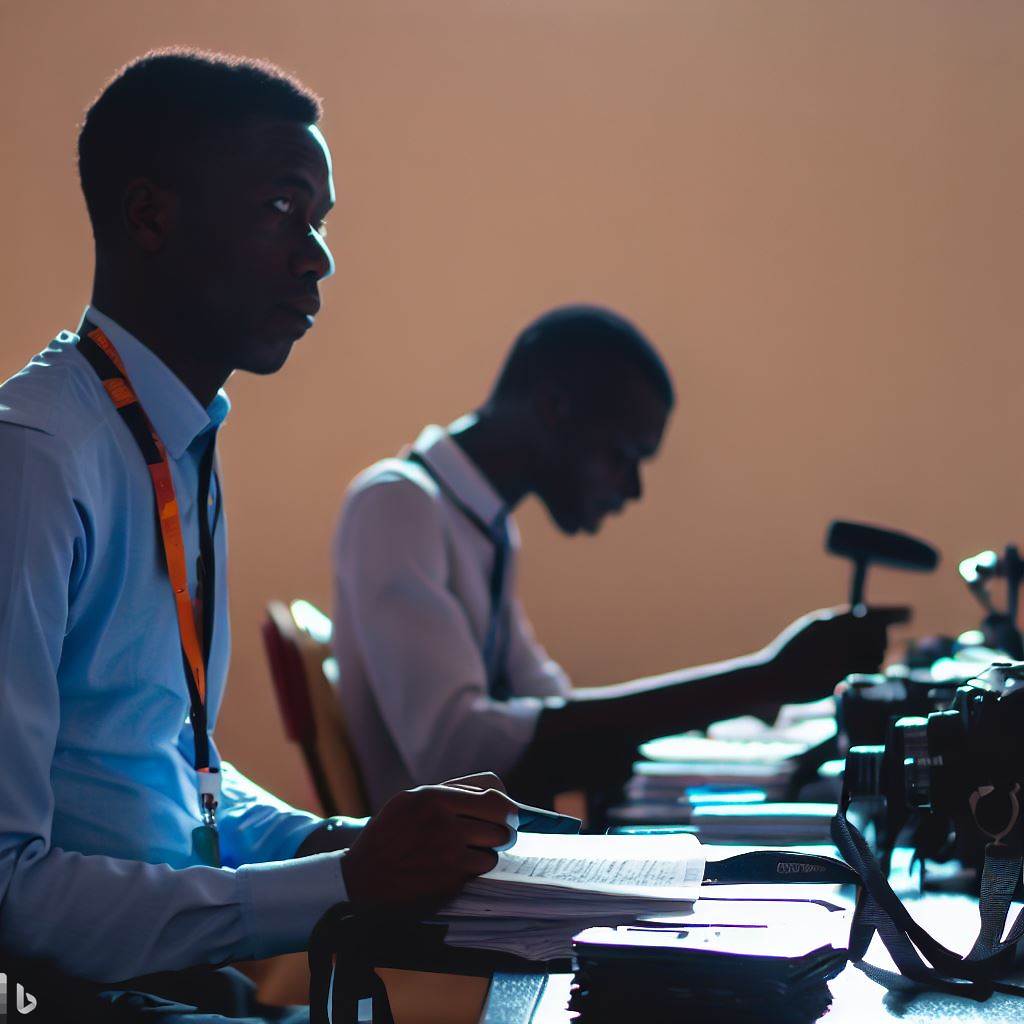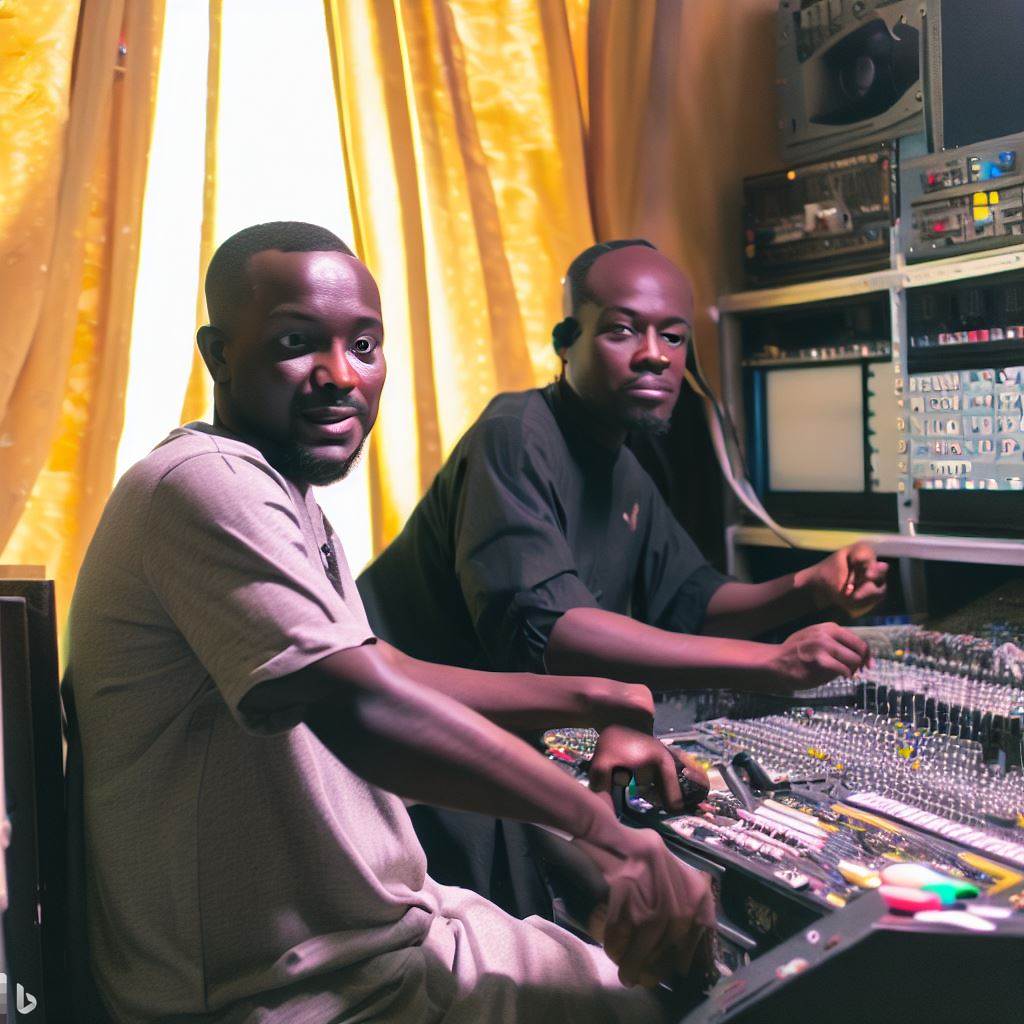Introduction
In today’s digital age, having multimedia skills is essential for aspiring journalists in Nigeria.
These skills not only elevate professionalism but also bolster credibility. This article delves into three pivotal skills that are integral to a journalist’s journey:
Mastery of investigative reporting empowers journalists to uncover hidden truths, bringing impactful stories to light.
In Nigeria’s context, this skill is a powerful tool to navigate complex issues, expose corruption, and drive positive change.
The art of effective storytelling transforms raw information into compelling narratives.
Aspiring journalists must learn to captivate audiences through well-crafted stories that resonate with readers, making the news engaging and relatable.
In an era dominated by digital media, being digitally literate is non-negotiable.
Proficiency in leveraging digital tools and platforms ensures journalists can reach wider audiences, adapt to evolving mediums, and maintain ethical online practices.
By honing these essential skills—investigative reporting, effective storytelling, and digital literacy—future journalists in Nigeria can pave their way to a successful and impactful career, contributing significantly to the nation’s media landscape.
Writing Skills
Importance of Strong Writing Skills
- Strong writing skills are crucial for journalists as writing is the primary tool of their trade.
- Well-written articles capture and maintain readers’ attention, increasing the chances of conveying the intended message effectively.
- Journalists with strong writing skills can engage their audience, inspiring them to think critically and respond to the news.
Improving Writing Skills through Practice and Feedback
- Practice regularly: Writing daily or frequently helps aspiring journalists refine their skills and develop their unique writing style.
- Set writing goals: Establish specific objectives or targets to enhance focus and make progress in terms of writing ability.
- Seek feedback: Share work with colleagues or mentors who can provide constructive criticism to identify areas for improvement.
- Study great works: Analyze the writing of successful journalists to identify techniques, styles, and approaches worth emulating.
- Learn from mistakes: Reviewing and reflecting upon past writing errors can lead to growth and prevent recurrence.
Tips for Effective News Writing
Clarity
- Communicate clearly using impactful language.
- Avoid jargon and unnecessary complexity.
- Organize thoughts logically for easy understanding.
Conciseness
- Create concise sentences by removing unnecessary words.
- Focus on relevant details that add value.
- Convey critical information succinctly.
Accuracy
- Verify facts and figures, attributing sources.
- Cross-reference information for reliability.
- Maintain journalistic integrity with citations.
Active Voice
- Use active voice for engaging writing.
- Highlight subjects’ actions for impact.
- Limit passive voice usage.
Captivating Headlines and Leads
- Craft accurate, attention-grabbing headlines.
- Write compelling leads that entice readers.
- Provide concise overviews while piquing curiosity.
Inverted Pyramid Structure
- Start with key facts, then delve into details.
- Prioritize information by importance and immediacy.
Rigorous Editing and Proofreading
- Correct errors in grammar, spelling, punctuation.
- Remove inconsistencies and repetitions.
- Seek feedback and use tools for polished work.
Ethical Journalism Practice
- Present diverse perspectives, avoid bias.
- Respect privacy and adhere to guidelines.
- Uphold honesty and fairness.
In the end, honing writing skills is crucial for Nigerian aspiring journalists. Regular practice, feedback, and studying exemplary works are vital.
Effective news writing demands clarity, conciseness, accuracy, and active voice. Ethical journalism ensures impactful, audience-captivating news delivery.
Research and Investigation Skills
Highlight the significance of research and investigation in journalism
Research and investigation are vital for journalists in Nigeria to provide accurate and reliable information to the public.
Through thorough research, journalists can gather facts, analyze data, and uncover the truth behind any given story.
This is especially important in a country like Nigeria, where misinformation and fake news are rampant.
Journalists must go beyond just reporting surface-level information and delve deeper to uncover the truth.
Discuss various methods for conducting thorough research
- Internet Research: Journalists can utilize various search engines, online databases, and fact-checking websites to gather information and cross-reference facts.
- Library Research: Traditional methods of research involving books, magazines, scholarly articles, and archives provide valuable insights and historical context.
- Data Analysis: Through data mining and analysis, journalists can uncover trends, patterns, and statistical information related to their story.
- Interviews and Surveys: By conducting interviews with relevant individuals and conducting surveys, journalists can gather firsthand information and opinions.
- Documentation Review: Examining official records, reports, and documents can provide valuable evidence and support for investigative reporting.
Explain how to verify sources and fact-check information to ensure accuracy
To verify sources and fact-check information, journalists in Nigeria should:
- Cross-reference sources: Seek information from multiple sources to ensure accuracy and reliability.
- Check credibility: Assess the reputation and reliability of sources by considering their expertise, track record, and potential biases.
- Verify through official channels: Contact official sources or experts in the field to confirm information and ensure accuracy.
- Fact-check statements: Independently verify facts and statements made by sources through reliable sources and data.
- Seek multiple perspectives: Gather information from various viewpoints to avoid potential biases and provide a balanced report.
Provide tips on conducting interviews and gathering relevant information
- Preparation: Research the topic and the interviewee beforehand to ask informed questions.
- Build rapport: Establish a comfortable atmosphere to encourage interviewees to open up and provide relevant information.
- Active listening: Pay close attention to what the interviewee is saying and ask follow-up questions to clarify any unclear statements.
- Ask open-ended questions: Encourage the interviewee to provide detailed and thoughtful responses rather than simple yes or no answers.
- Respect confidentiality: Assure sources that their information will be treated confidentially if required, which may encourage them to share sensitive information.
In short, research and investigation skills are crucial for aspiring journalists in Nigeria.
By conducting thorough research, verifying sources, fact-checking information, and gathering relevant data through interviews, journalists can provide accurate and reliable news to the public.
These skills not only help combat misinformation but also contribute to the credibility and professionalism of journalism in Nigeria.
Multimedia Skills
The Growing Importance of Multimedia Skills in Journalism
In today’s digital age, having multimedia skills is essential for aspiring journalists in Nigeria.
Gone are the days when traditional print journalism was the sole medium for news consumption.
With the advent of the internet and social media, news is now consumed through various multimedia platforms.
Journalists need to adapt to the changing landscape by incorporating multimedia skills into their reporting.
Benefits of Incorporating Audio, Video, and Photography into Reporting
Incorporating audio into reporting allows journalists to capture the true essence of a story.
Listeners can hear the emotions in the voices of interviewees, adding depth to the story.
Video enhances storytelling by providing visual evidence and a more immersive experience for the audience.
Viewers can see the environment, facial expressions, and body language, making the story more engaging.
Photography helps capture powerful moments that words alone may not be able to convey effectively.
The benefits of multimedia in journalism include increased audience engagement and a broader reach.
Resources for Learning Basic Multimedia Skills and Techniques
- Online Courses: Platforms like Udemy and Coursera offer various courses on multimedia journalism.
- Youtube Tutorials: Many experienced journalists create tutorials on using multimedia tools and techniques.
- Professional Associations: Joining associations like the Nigerian Union of Journalists can provide networking and training opportunities.
- Internships: Seek internships at media organizations that focus on multimedia journalism to gain hands-on experience.
- Workshops and Conferences: Attend journalism workshops and conferences that cover multimedia skills and techniques.
- Practice: Take every opportunity to practice using multimedia tools in your reporting, even if only for personal projects.
- Collaborate: Partner with other journalists who possess strong multimedia skills to learn from their expertise.
- Experiment: Don’t be afraid to try new multimedia techniques and tools to enhance your storytelling abilities.
By utilizing these resources, aspiring journalists can develop their multimedia skills and stay relevant in the industry.
Multimedia skills are invaluable in today’s journalism landscape, and journalists must continuously learn and adapt to these tools.
Read: Nigeria’s Journalism Landscape: Past, Present, Future

Digital Literacy Skills
Relevance of digital literacy for modern journalists
Digital literacy is crucial for modern journalists as it empowers them to adapt to the evolving media landscape.
It enables journalists to effectively utilize digital tools and platforms to gather, verify, and distribute news content.
Navigating online platforms and using them effectively for news gathering and distribution
To navigate online platforms effectively, journalists must familiarize themselves with different platforms and their specific functionalities.
They should learn how to search and filter information, identify credible sources, and verify the authenticity of news material.
Furthermore, journalists should master the art of storytelling across various digital mediums, such as writing engaging articles, producing videos, or creating interactive content.
They should also leverage analytics tools to measure the impact of their content and refine their strategies.
Importance of understanding social media trends and ethics
Understanding social media trends is vital for journalists as it allows them to reach a wider audience and stay relevant.
By keeping up with the latest social media platforms, features, and algorithms, journalists can optimize their content and tailor it for different platforms.
However, while using social media for news gathering and distribution, journalists must also be mindful of ethical considerations.
They should follow established journalistic principles, such as accuracy, fairness, and integrity.
Journalists must be cautious about sharing unverified information or engaging in sensationalism, which undermines their credibility.
Read: Regulation and Ethics for Makeup Artists in Nigeria
Ethical and Legal Skills
Emphasizing Ethical Conduct in Journalism
Journalists in Nigeria must adhere to strong ethical conduct to promote truth, fairness, and accountability.
The following ethical guidelines are essential:
- Accuracy: Journalists should strive to report facts accurately and verify information before publishing.
- Impartiality: Maintaining impartiality ensures balanced reporting and eliminates bias.
- Independence: Journalists must avoid conflicts of interest and not allow external influences to compromise their reporting.
- Privacy: Respecting individuals’ privacy rights is crucial in ethical journalism.
Navigating Ethical Dilemmas
Journalists often encounter ethical dilemmas that require careful navigation. Some common dilemmas include:
- Reporting on sensitive topics: Journalists must consider the potential impact of their reporting on individuals’ lives.
- Protecting sources: Ensuring the confidentiality and safety of sources is essential to maintain trust and gather valuable information.
- Conflicts of interest: Journalists should be transparent about any personal, financial, or professional interests that could influence their reporting.
Understanding Legal Aspects of Journalism in Nigeria
Journalists need to have a good understanding of Nigerian defamation and libel laws to avoid legal repercussions:
- Defamation: Publishing false information that harms someone’s reputation can lead to defamation lawsuits. Journalists should verify facts and provide evidence to support their claims.
- Libel: Written defamation is known as libel. Journalists should exercise caution and ensure the information they publish is true and in the public interest.
Maintaining Integrity and Avoiding Conflicts of Interest
To maintain integrity, journalists should follow these tips:
- Transparency: Disclose any potential conflicts of interest to maintain credibility and trust.
- Impartiality: Remain unbiased in reporting and provide multiple perspectives on a story.
- Fact-checking: Verify information from reliable sources before publishing.
- Ethical decision-making: Consider the impact of reporting on individuals and society as a whole.
- Accountability: Publicly acknowledge mistakes and correct them promptly.
In fact, aspiring journalists in Nigeria must prioritize ethics and legal knowledge to excel in their profession.
By upholding strong ethical conduct, navigating dilemmas, understanding legal aspects, and maintaining integrity, journalists can contribute to a responsible and trustworthy media landscape.
Read: Ethics and Professionalism for Artists’ Agents in Nigeria
Delve into the Subject: Cinematography Training Opportunities in Nigeria: A Guide
Interpersonal and Communication Skills
The Significance of Interpersonal and Communication Skills in Journalism
- Effective interpersonal and communication skills are essential for aspiring journalists in Nigeria.
- These skills enable journalists to establish trust, build relationships, and gather accurate information.
- Interpersonal skills help journalists navigate diverse backgrounds and connect with people from various sectors.
- Communication skills allow journalists to effectively convey complex information to the audience in a compelling manner.
- Journalists with strong interpersonal and communication skills are more likely to secure exclusive interviews and uncover hidden stories.
Building Rapport with Sources and Establishing Professional Networks
- To build rapport with sources, journalists should approach them with respect, empathy, and genuine interest.
- Listening attentively and showing appreciation for the source’s perspectives help establish trust.
- Journalists should maintain professionalism, follow up on promised actions, and keep sources informed.
- Building professional networks involves attending industry events, joining journalism associations, and participating in online communities.
- Networking provides access to experts, mentors, and potential sources, enhancing the quality of journalistic work.
Tips on Effective Interviewing Techniques and Active Listening
- Prioritize thorough preparation by researching the interviewee, understanding the topic, and formulating relevant questions.
- Arrive early for the interview, dressed appropriately, and set up recording devices or note-taking tools.
- Engage in active listening by maintaining eye contact, nodding, and paraphrasing to show understanding and encourage further elaboration.
- Avoid interrupting the interviewee, allowing them to fully express their thoughts and emotions.
- Ask open-ended questions that encourage thoughtful responses and follow-up questions to dig deeper into important details.
- Show empathy and respect, even when discussing sensitive topics, to foster a comfortable environment for the interviewee.
Maintaining Objectivity and Avoiding Bias in Reporting
- Objective reporting is crucial for journalists as it ensures accurate, fair, and impartial news coverage.
- Journalists should separate personal opinions and emotions from their reporting, presenting information without bias.
- Fact-checking sources, using multiple perspectives, and presenting all sides of a story contribute to objectivity.
- Avoiding stereotypes and prejudices promotes inclusive and unbiased reporting.
- Journalists must critically analyze their own biases, be aware of societal prejudices, and strive to provide balanced coverage.
- Responsible journalism requires transparency about potential conflicts of interest and providing disclosures when necessary.
By developing strong interpersonal and communication skills, aspiring journalists in Nigeria can excel in their profession.
Building rapport with sources, conducting effective interviews, and maintaining objectivity are vital components of responsible journalism.
Read: Daily Life of a Nigerian Sound Effects Editor
Adaptability and Resilience Skills
Challenges Faced by Journalists in Nigeria and the Need for Adaptability
Journalism in Nigeria comes with its fair share of challenges that require aspiring journalists to be highly adaptable.
These challenges include:
- Censorship and media restrictions: Nigerian journalists often face censorship and restrictions imposed by the government, which hinders their ability to report freely.
- Threats to safety: Press freedom is under constant threat in Nigeria, with journalists facing physical attacks, intimidation, and even death while carrying out their duties.
- Lack of resources: Many media organizations in Nigeria operate on a limited budget, resulting in inadequate equipment, poor infrastructure, and low salaries for journalists.
- Corruption: Nigeria has a significant problem with corruption, and journalists often face pressure and interference when reporting on this issue, which requires them to navigate sensitive situations with caution.
Given these challenges, adaptability is crucial for aspiring journalists in Nigeria.
Adaptable journalists have the ability to quickly adjust and find alternative ways to gather information and report on stories, without compromising their integrity.
Developing Resilience in the Face of Setbacks and Criticism
Resilience is a fundamental skill for journalists in Nigeria, as setbacks and criticism are inevitable in this profession. Here are some ways to develop resilience:
- Accept and learn from failure: Rather than allowing setbacks to demotivate you, view them as opportunities for growth and learning.
- Build a support network: Surround yourself with like-minded individuals who can offer support, advice, and encouragement during challenging times.
- Practice self-care: Taking care of your physical and mental well-being is vital. Engage in activities that help you relax and recharge, such as exercise, meditation, or spending time with loved ones.
- Develop coping mechanisms: Find healthy ways to cope with stress and criticism, such as finding humor in difficult situations or practicing positive self-talk.
Staying Motivated and Open to Learning New Skills
Journalism is a dynamic field that requires continuous learning and growth. Here are some tips to stay motivated and open to learning:
- Set goals: Having clear and achievable goals can provide a sense of direction and motivation to work towards.
- Embrace technology: Stay updated with the latest tools and technologies in journalism to enhance your skills and work more efficiently.
- Seek feedback: Request feedback from experienced journalists or mentors to identify areas of improvement and gain valuable insights.
- Read widely: Stay informed about a wide range of topics and perspectives by reading newspapers, books, and online resources. This broadens your knowledge base and helps you develop a well-rounded journalistic approach.
It is essential to remember that adaptability, resilience, motivation, and continuous learning are not only vital skills for aspiring journalists in Nigeria, but they are also qualities that can drive success in any journalistic career, regardless of the location.
By honing these skills, aspiring journalists can overcome challenges, create impactful stories, and contribute meaningfully to the field of journalism in Nigeria.
Explore Further: Top Artists’ and Performers’ Managers in Nigeria Today
Conclusion
The essential skills for aspiring journalists in Nigeria include strong communication and writing abilities, research skills, and the ability to adapt and work in a fast-paced environment.
Aspiring journalists in Nigeria should continually develop these skills through practice, attending workshops, and seeking mentorship opportunities.
Lastly, it is vital for journalists to practice ethical journalism and contribute positively to the field by promoting accurate and unbiased reporting, upholding professional integrity, and advocating for the public interest.
Remember, journalism is a noble profession that holds immense power and influence.
By honing the essential skills discussed in this blog post, aspiring journalists in Nigeria can make a significant impact and contribute positively to society.
Keep striving for excellence, remain curious, and never stop learning. Nigeria needs ethical journalists who can uncover the truth and tell compelling stories that shape the nation’s future.
Embrace the responsibilities that come with being a journalist and work towards upholding the highest standards in the field.
Together, we can create a stronger and more informed society.




